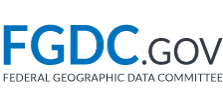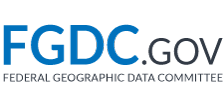Host: Chris Clarke, Department of Agriculture
Introduction and Announcements - John Moeller
2001 NSDI Cooperative Agreements Program (CAP)
This years CAP will be on-line at the FGDC website the week of January 16, 2001. The grant program will provide seed funds to implement metadata, integrate clearinghouse with web mapping, and promote collaborative framework activities along the US and Canadian border. Proposal submission period closes March 15, 2001. All organizations may apply. Announcement will be posted at: http://www.fgdc.gov/funding/funding.html. For more information contact David Painter, FGDC.
Recognition and appreciation to outgoing FGDC Chair
A plaque and letter of appreciation will be presented to FGDC Chair Bruce Babbitt tomorrow Wednesday 10, 2001. Secretary Babbitt is recognized for his commitment and visible promotion of GIS and NSDI to the entire geospatial data community.
Next FGDC Steering Committee Meeting
There is a need to hold a Steering in the next 6 weeks. Chair for this meeting needs to be identified.
- Action: Determine next Steering Committee meeting date and chair.
Sustainable Resources Data Working Group - Paul Geissler, DOI; Rich Guldin, USDA
A new FGDC Working Group is proposed. Its objective would be to further the goals of sustainable resources by fostering the standardization and implementation of criteria and indicators (C&I) of sustainability. Scope of the group's activity will be to develop standards and protocols for collecting monitoring, analyzing reporting and the availability of data. The working group's initial focus will be on the Montreal Process Criteria and Indicators for the Conservation and Management of Temperate and Boreal Forests. The working group will be co-chaired by USGS and the USDA-Forest Service. Federal agencies that have interests in sustainable forest issues will and should participate in the working group. Non-federal organizations are encouraged to participate on the Roundtable on Sustainable Forests (). Discussion recommendations include definitions of data as spatial, and emphasis on the public availability and sharing of data. Due to the overlap of interests this working group and the Sample Inventory and Monitoring of Natural Resources and the Environment (SIMNRE) Working Group, these two groups should look for opportunities for collaboration.
- Action: Review and comment on draft Sustainable Resources Data Working Group Working Group Charter and provide recommendations to Paul Geissler (Paul_Geissler@usgs.gov) and Rich Gould within two weeks for discussion at next Coordination Group meeting. Due date January 26, 2001.
Draft text of Working Group Charter
PowerPoint presentation
Cooperating Technical State Agreement with North Carolina - Mike Buckley, FEMA and John Dorman, North Carolina Office of State Budget, Planning and Mangement
Current status of the North Carolina Floodplain Mapping Project under the CTS agreement was discussed. Project will result in timely map products, elevation data, digitally formatted data and an on-going data maintenance process. In addition, the project will support interoperability, data sharing and communication via the Internet of public domain information for real-time flood prediction. 95% of the work is being done by contrast in the private sector. Existing data, requirements and drainage basin project planning is underway. This is a good example of a high visibility activity addressing a critical hazard - hurricanes, that has been leveraged into a cooperative agreement. The state of North Carolina has committed $23M to support this project with plans for additional funds in the future. Sixteen Federal agencies have signed on to participate. The MOU explicitly directs implementation of the NSDI as part of the project including metadata. There is an outstanding need to develop standards for elevation, transportation and flood mapping. Other states have expressed interest in the project and NC is building a notebook of "best practices," for developing incentives for sharing, implementing standards. Cost-benefit analysis indicated that with the availability of project data would greatly reduce losses. Coordination Group members not currently working with NC on this project are invited to meet with NC and participate as a CTS partner. Periodic update of the floodplain project is recommended for future coordination meetings. A project website will be established soon at http://www.ncfloodmaps.com.
North Carolina Statewide Flood Mapping Program
Phases for North Carolina Statewide Flood Mapping Program
Community Demonstration Project - Paul Dresler, DOI
The NSDI Community Demonstration Project began in July 1998, and was completed in May 2000. Each project was designated as a National Partnership for Re-Inventing Government Re-invention Laboratory. The six project communities are Baltimore, MD (crime analysis); Dane County, WI (comprehensive planning); Gallatin County MT (Smart Growth); Tillamook County, OR (flood mitigation); Tijuana River Watershed, CA (environmental restoration): and the Upper Susquehanna-Lackawanna Watershed, PA (flooding and environment). These projects were designed to:
- Show cross-government applications to solve community problems
- Support results-driven management practices utilizing up to date spatial data
- Strengthen efforts to set cross-government interoperable data sharing standards
- Supply federal expertise for resolving data, policy, standards and technical issues related to cross-government information sharing
- Share project results nationwide.
Based on the results of the NSDI Community Demonstration Project it is recommended that: the NSDI community should initiate and expand community projects that support community planning, and reduce or eliminate the barriers communities encounter in building and maintaining the ability to use geospatial data resources. To achieve this it is further recommended that metadata and data standards be promoted and applied, establish and link data clearinghouses, build data application libraries and geodata tool libraries, establish data consortia and partnerships, and continue collaboration with others to develop and advance the NSDI. Recommendations include: framework themes need to be expanded to include additional themes (e.g. soils) as a national effort; need for better access of local counties to Federal agencies resources, need to better able visualize data to improve map communication potential, the avoidance of duplication of effort, better linkage to clearinghouse, and better application tool documentation.
Final report and Powerpoint presentations of each project will be posted at the FGDC website within the next few weeks.
Geographic Information and Local Governments: Potentials and Pitfalls for NSDI: Report on research findings - Dr. Francis Harvey, University of Kentucky
This research builds on and continues the analysis of the NSGIC/FGDC National Framework Survey focusing on local government in Kentucky. The major findings are: that more outreach to promote the NSDI and its benefits at the local level is needed, local governments share data and coordinate informally, and that effective data sharing requires levels of trust between the organizations involved. Conformance to external standards was perceived as curtailing local control, however, the modification of those standards for local use increased the sense of local control. Dr. Harvey felt that the Kentucky research could be extrapolated to other states, however, he thought that states would vary due to data theme.
Research report can be found at http://www.uky.edu/AS/Geography/ppnsdi/reports/reports.html
Framework I-Team Initiative: guidelines, call for action, implementation plans, and next steps - John Moeller, FGDC.
Due to lack of time at meeting full discussion on this topic will be deferred to the next coordination group meeting. Work continues to get agreements in place and establish finance teams.
- Action: Coordination Group should ensure that appropriate individuals in their agencies, particularly, be made aware of the startup of this initiative.
For more information go to the OMB Initiative webpage at http://www.fgdc.gov/I-Team/
Framework Survey Clearinghouse Access - Doug Nebert, FGDC
Extending the utilization of the NSGIC/FGDC Framework Survey a Clearinghouse search wizard has been established to allow for search on the more than 3,500 survey entries of organizations creating and maintaining framework theme data. A skeletal metadata record at the organizational level was created for each survey entry indicating the theme, area of coverage and contact information. Over time it is hoped that state or regional organizations will take the responsibilities to maintain and expand these entries as complete dataset-level metadata.
To use: (1.) go to NSDI Search Wizard to "smart-select" servers and data at http://clearinghouse1.fgdc.gov/FGDCgateway.html, (2.) select topic of interest (a framework theme), (3.) define geographic area of coverage, (4.) select data servers to search - "Framework Data Survey", (5.) and optionally refine search criteria.
OMB Circular A-16 Revision - Milo Robinson, FGDC; Carl Zulick, NPR; Tony Frater, OMB To date 26 responses have been received for the revision of the Circular A-16. All except 7 unresolved items were incorporated into the draft text. Several of the unresolved items were need to be addressed at a higher level. Comments on specifying conditions of expenditure for Federal funds, theme/layer terminology, GIO/CIO staff performance plan conformance, were discussed.
- Actions:
(1) Milo Robinson will address comments received today and other outstanding comments, and prepare and distribute new draft by the end of this week.
(2) Coordination Group will review and comment on draft to Milo Robinson by January 26, 2001.
(3) A small number of the Coordination Group members to meet week of January 29 to resolve any issues. Coordination Group members interested in participating in this session should submit their name to Milo Robinson (mrobinson@usgs.gov) by January 26 or sooner if possible. Date and place of meeting TBD.
(4) Coordination Group Meeting February 6, 2001, for discussion and recommendation of draft A-16 submission to Steering Committee.
Draft OMB Circular A-16 version January 8, 2001
Next Meetings:
- FGDC Coordination Group
February 6, 2001
9:00am - 3:00pm
Site: TBD
Tentative agenda:
- Circular A-16
NSDI Clearinghouse
Geography Network
OMB Implementation Teams
Standards Recommendations
TBD February, 2001

